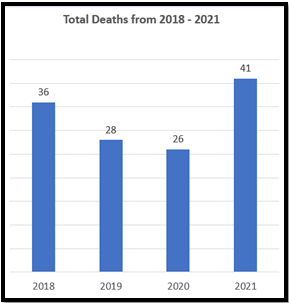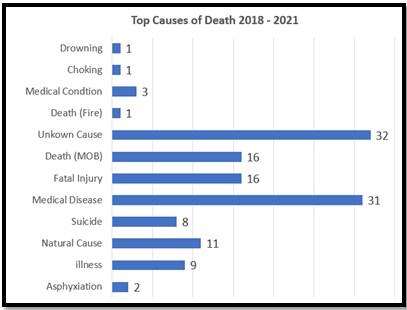Earlier this year, a Chief Cook on board a Singapore-registered ship was suddenly found dead in his cabin. The discovery was made at about 7.00 am on the day, when the Cook was not seen as usual at the Mess Room at breakfast time.
At about 6.40 am, one of the Deck Officers arrived at the Mess Room for breakfast. The Mess Man informed the Officer that he had not seen the Chief Cook till then, which was unusual. The Mess Man had attempted telephoning the Chief Cook’s cabin but there was no response. Realising that something was amiss, the Officer reported to the Chief Officer about the Cook’s absence and requested for the master key. He then went to the Chief Cook’s cabin and knocked on the door. Upon receiving no response, the Officer used the master key to open the door of the Chief Cook’s cabin, which was locked from inside. Upon entering, the Chief Cook was observed to be lifeless and seated in his chair. The Deck Officer called out and shook the body of the Chief Cook but there was no response. When the Chief Officer arrived at the cabin, he checked for vital signs and found there were none. Both Officers immediately proceeded to the Bridge to report what had happened.
Based on information from the other crew, the Chief Cook had reportedly not suffered any symptoms or observed to have been of ill health. Nobody was aware if the Chief Cook had been taking any personal medications or had mentioned this before. The Chief Cook was known to be kind-hearted and pleasant in nature and had never complained of any personal or family issues. The death was considered to be sudden and unfortunate.
Findings
The Chief Cook was a 50-year-old, who did not have a history of medical conditions. He had joined ship in Singapore and had been on board for about 10 months at the time of the incident.
Seafarers are required to undergo medical examinations periodically. In this instance, the Chief Cook underwent a medical examination in March 2021, 2 months prior to joining ship and 14 months prior to his death. The medical report did not contain any adverse remarks and the Chief Cook was certified fit for sea service and given a clean bill of health. According to the Master’s statement, the Chief Cook was not known to have suffered from any underlying medical condition and the Master was not aware if he was under any medication. However, the Death Certificate stated that the Chief Cook had died of natural causes and that the immediate cause was cardiac conduction disorder (presumptive).
This incident is an example of an increasing number of fatalities at sea. As may be seen from the table below, there was an overall increase in fatal incidents in 2021 by more than 50% compared to the year before. Medical disease and related conditions are among the main causes, and this has been the trend over the last few years. However, similar to the case study above, it is often a case where the seafarer’s medical report did not indicate any pre-existing medical conditions. Yet many a fatality is subsequently certified to be caused by cardiac-related factors or other existing but unknown medical conditions.


Recommendations
It is important to acknowledge what appears to be limitations in pre-joining medical examinations. It should also be realised that certain pre-existing medical conditions may be at a very early stage at the time of the examination and may develop further, or even worsen, while the seafarer is on board.
Ship operators and management companies may consider additional measures to be implemented on board ships to verify or monitor the general health of their crew. As an example, and without any undue discrimination, crew who appear to be obese may be advised to undergo an exercise programme during their employment on board. This can be further supplemented by interim medical checks, depending on the duration of the crew’s tenure on a particular ship. With reference to the case study, the Chief Cook had been on board for a period of 10 months at the time of his death.
There may continue to be cases of sudden and untimely death of ships’ crews. These may even sometimes be attributed to death due to “unknown causes”. However, there is nothing to stop the shipping community from exploring ways and means to ensure that all efforts are taken to improve and maintain the health condition of seafarers while employed on board ship. As long as concerted effort is put in and actions taken in this regard, there exists great optimism towards the reduction of medical related fatalities and being able to detect early danger signs that may be detrimental to the health and well-being of seafarers, so that early remedial measures could be taken to prevent any medical fatalities onboard.
